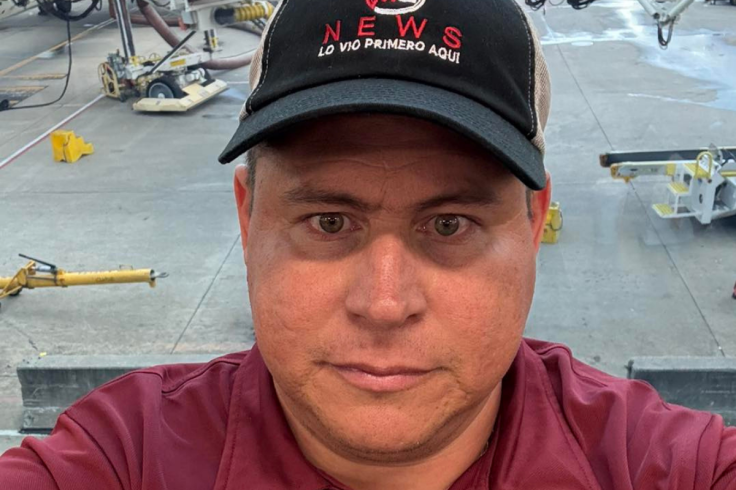Who Is Mario Guevara? Journalist Who Livestreamed Anti-Trump Protest Detained By ICE, May Be Deported
Despite wearing a press vest, Guevara was detained and handed to ICE—his case now draws national attention

US border patrol agents have uncovered and dismantled a sophisticated underground tunnel stretching from Tijuana, Mexico to San Diego, California—a secret passage used for large-scale drug smuggling.
The US Customs and Border Protection (CBP) described the tunnel as a potential tool not only for drug traffickers but also for terrorist groups, sparking renewed national security concerns.
The uncompleted tunnel, which extended more than 1,000 feet into US territory, was detected in April and successfully sealed on Wednesday 18 June 2025, according to an official CBP statement. Authorities say the discovery highlights a growing shift in how criminal and potentially terrorist organisations attempt to exploit underground routes to bypass heavily monitored borders.
What Did Border Patrol Find?
Following a tip-off and subsequent investigation, the CBP Tunnel Team entered the underground passage, which measured 2,918 feet (890 metres) in total length and reached a depth of nearly 50 feet. While navigating the tunnel, agents encountered makeshift barricades apparently designed to delay detection.
'The uncompleted tunnel extended more than 1,000 feet inside the US and was highly sophisticated,' CBP confirmed in a press release.
Despite being unfinished, the tunnel was already equipped with electrical wiring, lighting, a ventilation system, and even a rail track—indicative of its intended use for smuggling large volumes of illegal drugs.
Border patrol agents traced the tunnel's origin to the Nueva Tijuana neighbourhood in Mexico. The exit point, meanwhile, was located within a commercial warehouse in San Diego.
A Warning Sign of Underground Terror Threats?
San Diego Sector Acting Chief Patrol Agent Jeffrey D. Stalnaker raised alarms over the tunnel's complexity and potential misuse by foreign terror groups.
'As we continue to strengthen the nation's air and maritime border security, it's not surprising that foreign terrorist organisations would resort to underground routes,' he told Fox News.
Stalnaker added: 'Disruption of narcotics smuggling tunnels is critical to protecting American lives.'
When and Where Did This Take Place?
This all played out in broad daylight on Saturday, 14 June, near Chamblee Tucker Road, a stretch often used for public demonstrations in the Atlanta metro area. Guevara had covered events like this before. This time, though, police cleared the crowd using tear gas.
He was booked into DeKalb County Jail, and while bond was initially granted, ICE filed a detainer. Instead of walking free, Guevara was moved to Stewart Detention Center, where he remains under immigration custody.
@tres_amores877 Arrestaron a Mario Guevara de MG News #protestas #eeuu🇺🇸 #marioguevara
♬ Very Sad - Enchan
Who Is Mario Guevara?
At 47 years old, Guevara has become a key voice in Georgia's Latino media. He fled El Salvador in 2004, escaping violence, and has since built a trusted platform through his outlet MGNews. His reporting, often broadcast live to hundreds of thousands, focuses on immigration, policing, and local protests.
In 2021, his work was recognised with a Southeast Emmy Award. Though not employed by a mainstream network, he's been known in the community as the go-to reporter when immigration enforcement ramps up.
Why Are People Paying Attention?
Because this isn't just about one arrest it touches a nerve. Guevara wasn't protesting; he was reporting. That line, some argue, has become dangerously thin. Groups like the Committee to Protect Journalists are calling this case a threat to press freedom.
Guevara has remained in the U.S. legally for years. He has a valid work permit and a pending green card application through his American-born son. Still, his earlier asylum claim filed in the early 2010s was denied. ICE appears to be acting on that old record now.
How Are Authorities Justifying It?
They're not, at least not yet. ICE hasn't offered any public comment, and DeKalb Police have declined to say why Guevara wasn't recognised as a journalist at the time. His legal team is preparing to challenge the basis of both the criminal and immigration proceedings.
Meanwhile, press groups are amplifying the issue, warning that punishing journalists for being near tense political events creates a chilling effect. It's a case they say the public should be watching closely.
What's Next for Guevara?
He remains in detention, awaiting a hearing in immigration court. His lawyers are hoping to halt the deportation on the grounds of legal residency and public interest protections. Whether that succeeds is unclear.
Until then, the man who made a name capturing other people's stories is now the subject of one himself.
© Copyright IBTimes 2025. All rights reserved.




















